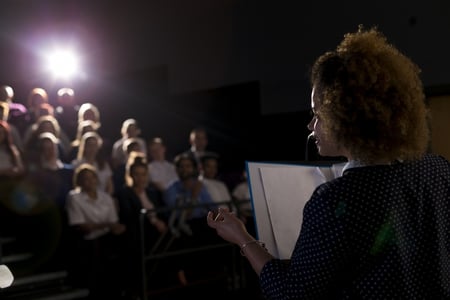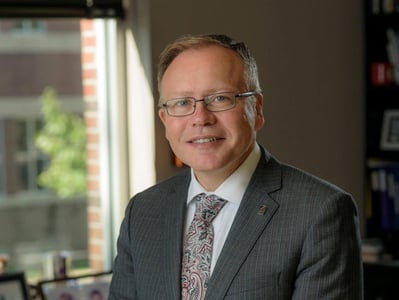
February 11 2019
We believe firmly that everyone, no matter their age or longevity in the academy, can be on the cutting edge of change.
In fact, a recent meta-analysis of nearly a hundred empirical studies determined that there is no correlation between age, length of organizational employment, and the creation and implementation of innovative ideas and behavior. The vast majority of university faculty do amazing work, and it is evident in the performance of our students while enrolled and particularly after they graduate. But there is a deep cultural dynamic that often undermines the ability of forward-thinking faculty to innovate and take risks: a culture of seniority, wrapped around the system of tenure.
The 2016 book Locus of Authority: The Evolution of Faculty Roles in the Governance of Higher Education argues that “every issue facing today’s colleges and universities, from stagnant degree-completion rates to worrisome cost increases, is exacerbated by a century-old system of governance that desperately requires change.” The new university must retool the system of tenure and challenge the culture of seniority in order to align closely with the values of student-centeredness; responsiveness to the changing needs of learners; innovation; and experimentation not only within a particular discipline, but in service to institutional vision and strategic goals.
Case Study: Dakota Wesleyan University
In working to create such a partnership, DWU’s leadership knew that before they could introduce significant change across the institution, they needed to thoroughly and deliberately create awareness around the urgency of the institution’s circumstances. Enrollments were declining because there weren't enough students. The demographics alone painted a bleak picture of unsustainability for any institution not willing to invest in the quality, relevance, and visibility of its educational experience.
To make such an investment, DWU’s leadership needed the full support and participation of the faculty. In public addresses, President Novak drew on stories from the earliest history of the institution in the late 1800s and into the early 1900s to share the university’s long-standing connection to rural innovation, including early commitments to satellite campuses near Native American reservations and across the area.
She posed the question: given our mission and our history, what are our core competencies, and where can we both bring the most value to our students and truly excel in our work? Collectively, the campus community determined that agility and innovation were two of the institution’s greatest strengths. With a commitment to those two values, they began to explicitly recognize them both in general review and reward processes, and in the tenure process in a variety of ways, including:
- Adoption of new pedagogies: DWU consistently recognizes faculty members that contribute to innovative pedagogy and has also recognized the valuable learning created by failure when taking this type of risk. There is a place for reflection in the tenure evaluation on what failures that faculty has experienced in their teaching, and what learning and change those challenging experiences yielded.
- Professional development: Furthering one’s own learning and development through training aligned specifically with strategic initiatives is considered during the tenure process, and the institution invests in that development accordingly. For example, faculty who participated in training at Apple’s Cupertino headquarters or in digital workshops held by Apple leaders on campus related to Digital DWU’s Initiative can feature that in their tenure applications.
We have witnessed President Novak’s continuous efforts to praise the campus community and remind them what they have done and are doing to rise above the competition, contributing to high levels of motivation and commitment on behalf of the faculty across the institution.
Courageous Leadership: Championing Disruption, Risk, and Innovation Challenge Questions
- Does your institution celebrate and reward risk-taking?
- Does your culture reward continuous internal learning and experimentation for faculty and staff?
- Is the search for consensus an obstacle to agility and innovation at your institution?
Did you know that Credo facilitates Aspiring Leaders Workshops? Usually offered in partnership with a higher education organization or association, these workshops give the next generation of leaders an opportunity to evaluate their own skills, gifts, and calling against the primary leadership needs in today’s independent higher education environment.
Find out how you and your organization can benefit from Aspiring Leaders Workshops.
© Credo and www.credohighered.com, 2018. Unauthorized use and/or duplication of this material without express and written permission from this site’s author and/or owner is strictly prohibited. Short excerpts and links may be used, provided that full and clear credit is given to Credo, Credo Press, and www.credohighered.com with appropriate and specific direction to the original content. Please email info@credohighered.com for information on how to obtain a full copy of Pivot: A Vision for the New University or for permission to use excerpts from the book and/or blog series.
Related Blog Posts
Recent Posts
- Richard Dunsworth, J.D., To Receive 12th Annual Courageous Leadership Award December 16 2024
- Meet the 2024 Credo Values Award Recipients August 27 2024
- What is Executive Coaching, Really? June 25 2024
- Credo & The Constructive Dialogue Institute Announce A New Partnership For Higher Education Leadership Development March 7 2024
- Celebrating Women And Gender-Diverse Learners & Leaders February 28 2024
Categories
- Strategy
- Leadership
- Student Success
- Student Success & Retention
- Enrollment
- Pivot
- Strategic Planning
- Leadership Development
- News
- Strategic Enrollment
- Campus Planning and Architecture
- Moving the Needle
- Data
- Research
- Retention
- Campus Master Planning
- Enrollment & Financial Aid
- Academic Programming
- Campus Planning
- Thriving
- Admitted Student Research
- Architecture
- Finance
- Advising
- Admissions




